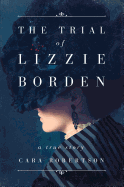
Cara Robertson's nonfiction debut, The Trial of Lizzie Borden, examines the sensational 19th-century murders of Andrew and Abby Borden, which have continued to captivate the public's imagination for more than a century. Robertson tracks the crime from the family's tumultuous personal history through the murder, preliminary hearings, trial and verdict. Along the way, she manages to reveal fresh insights and details about the crime and the trial, illuminating alternative theories and documenting incriminating evidence, such as Lizzie's previous attempts to purchase poison. Nevertheless, the book returns again and again to the conflicting images of Lizzie that both the jury and the present-day reader are unable to bring together as one: that of a church-going, accommodating daughter, and an ax-wielding manipulator.
Robertson, a lawyer and former legal adviser to the International Criminal Tribunal for the former Yugoslavia at The Hague, has accomplished a herculean task in compiling the minutiae of such a trial and presenting it all clearly and concisely. But she doesn't stop here. Robertson also manages to craft these facts into a compelling, tightly paced courtroom drama that not only asks who may have committed this crime but how someone could have done so--psychologically, emotionally and mentally. By the end, as in the beginning, the reader suspects that Lizzie did, indeed, murder her parents. But the story's real tension resides in examining her words and behavior during the trial. Like most true-crime tales, it is the hypnotic magnetism of the criminal's ability to commit such an act that brings us back to the same evidence, the same statements, the same witnesses, even hundreds of years later, in hopes of understanding something new and disturbingly human. --Alice Martin, freelance writer and editor

